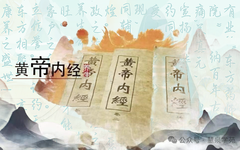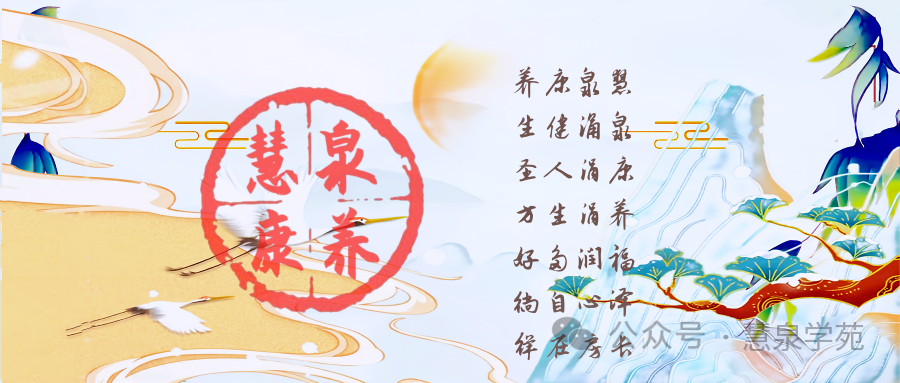The Huangdi Neijing is divided into two parts: the “Lingshu” and the “Suwen”. It is said to have originated from the Yellow Emperor Xuanyuan and has been passed down orally through generations, later supplemented and developed by physicians and medical theorists, culminating in a written form during the Spring and Autumn and Warring States periods.
In the dialogues between the Yellow Emperor, Qi Bo, and Lei Gong, it elucidates the mechanisms and pathology of diseases while advocating for the treatment of diseases before they manifest, as well as promoting health preservation, longevity, and vitality. It is one of the four classic texts of traditional Chinese medicine (TCM) alongside the “Nanjing”, “Shanghan Zabing Lun”, and “Shennong Bencao Jing”, and is the earliest existing medical classic in China’s medical treasury.
It theoretically establishes the “Yin-Yang and Five Elements Theory”, “Pulse Theory”, and “Zangxiang Theory” in TCM. It is indeed the outline of TCM!
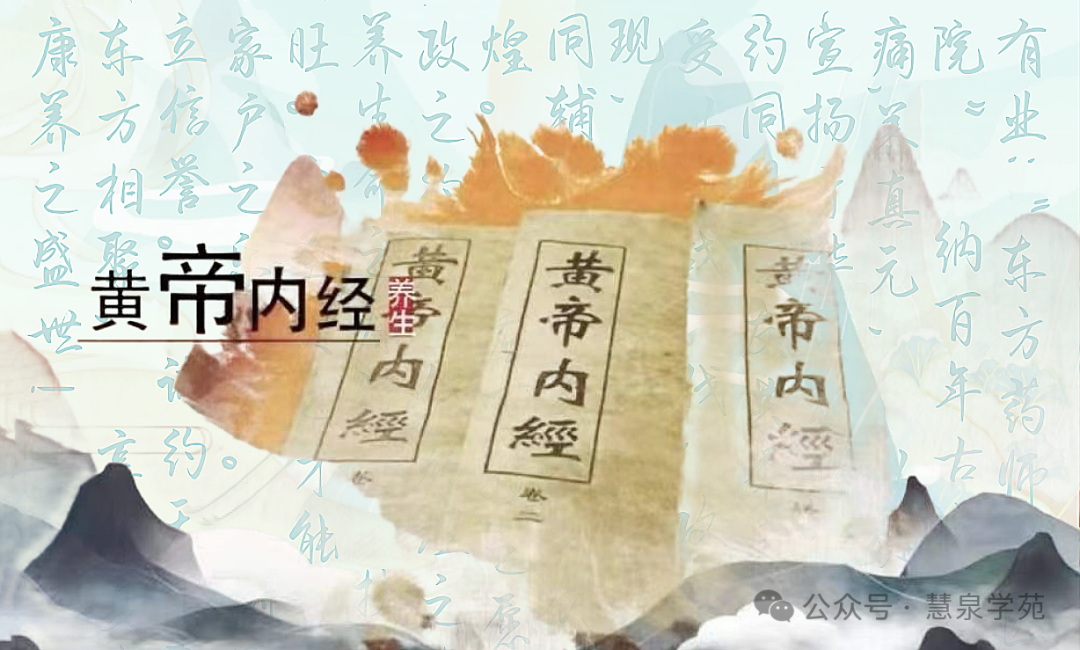
Summary As long as it is a problem with the tendons, treating the liver is correct. As long as it is a problem with the bones, treating the kidneys is correct. As long as it is a problem with the muscles, treating the spleen and stomach is correct. As long as it is a problem with the blood vessels, treating the heart is correct. As long as it is a problem with the skin and hair, treating the lungs is correct.Five Organs
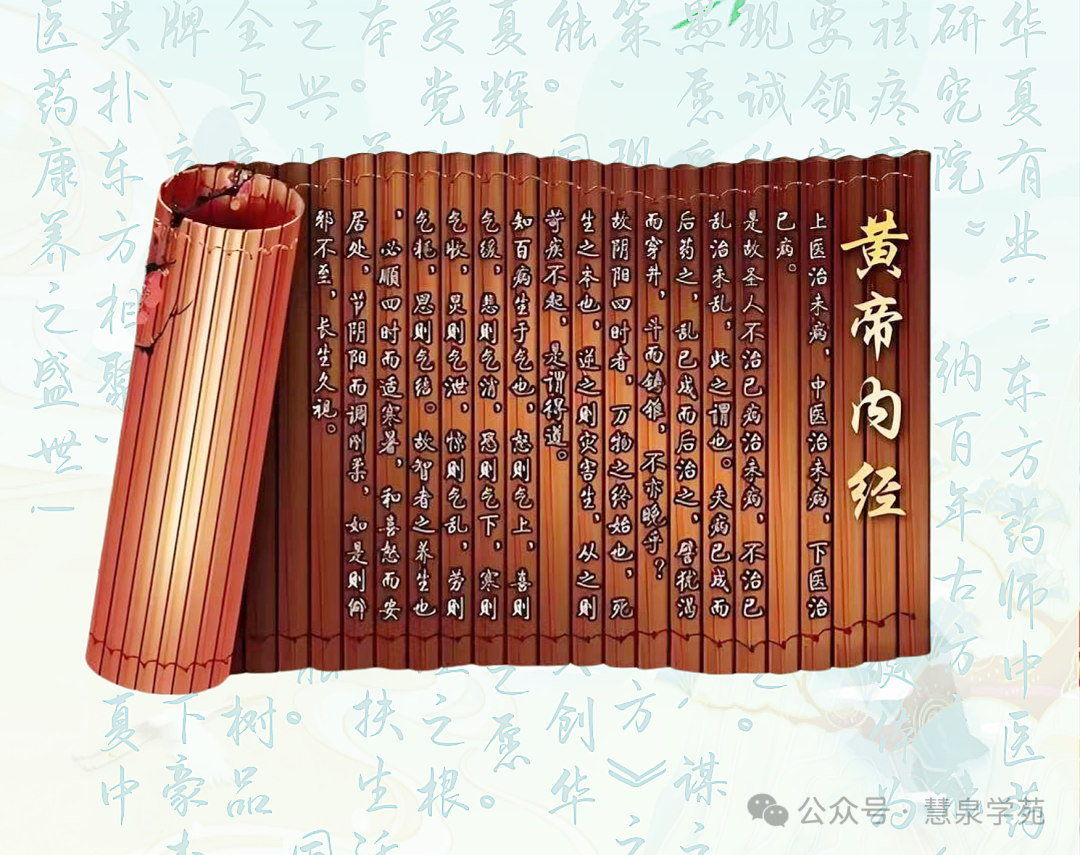
Liver:The liver is the residence of the soul, the storehouse of blood, and the source of tendons. It belongs to the wood element in the Five Elements, governing upward movement. Physiological functions: ① governs the smooth flow of Qi; ② stores blood; opens to the eyes, connects with tendons, manifests in the nails, associated with anger, and tears; the liver and gallbladder are interrelated.Heart:The heart is the residence of the spirit, the master of blood, and the source of pulses. It belongs to the fire element; physiological functions: ① governs blood vessels; ② governs consciousness; the heart opens to the tongue, connects with the pulse, manifests in the face, associated with joy, and sweat; the heart and small intestine are interrelated.Spleen:The spleen is the source of Qi and blood transformation, the foundation of postnatal life, and stores intention, belonging to the earth element. Physiological functions: ① governs transportation and transformation; ② governs the upward movement of clear Qi; ③ governs blood regulation; opens to the mouth, connects with flesh, governs the four limbs, manifests in the lips, associated with thought, and saliva; the spleen and stomach are interrelated.Lung:The lung is the residence of the corporeal soul, the master of Qi, belonging to the metal element; physiological functions: ① governs Qi and respiration; ② governs the dispersing and descending of Qi; ③ regulates water pathways; ④ governs the hundred vessels and regulates their flow; assists the heart in regulating Qi and blood circulation; the lung opens to the throat, connects with the skin, manifests in hair, opens to the nose, associated with worry, and nasal discharge; the lung and large intestine are interrelated.Kidney:The kidney is the foundation of pre-natal essence, stores will, and the waist is the organ of the kidney, belonging to the water element; physiological functions: ① stores essence, governs growth, development, and reproduction; ② governs water; ③ governs the intake of Qi; connects with bones, governs bone marrow, manifests in hair, opens to the ears and the two yin (anus and perineum), associated with fear, and saliva; the kidney and bladder are interrelated. Six Fu Organs
Six Fu Organs Gallbladder: Physiological function: stores and excretes bile, governs decision-making.Stomach: Physiological function: receives and digests food and drink, the stomach descends to harmonize. Small Intestine: Physiological function: governs reception and transformation, separates the clear from the turbid, “the small intestine governs fluids”. Large Intestine: Physiological function: transmits and transforms waste, the large intestine governs fluids. Bladder: Physiological function: stores and excretes urine, relying on the kidney’s Qi transformation function. San Jiao: Physiological function: facilitates the flow of Yuan Qi, governs Qi mechanisms and transformations, and is the pathway for water and fluids.
Gallbladder: Physiological function: stores and excretes bile, governs decision-making.Stomach: Physiological function: receives and digests food and drink, the stomach descends to harmonize. Small Intestine: Physiological function: governs reception and transformation, separates the clear from the turbid, “the small intestine governs fluids”. Large Intestine: Physiological function: transmits and transforms waste, the large intestine governs fluids. Bladder: Physiological function: stores and excretes urine, relying on the kidney’s Qi transformation function. San Jiao: Physiological function: facilitates the flow of Yuan Qi, governs Qi mechanisms and transformations, and is the pathway for water and fluids. Conclusion
Conclusion The basic spirit and main content of the “Huangdi Neijing” include: holistic concepts, Yin-Yang and Five Elements, Zangxiang and meridians, etiology and pathogenesis, diagnostic methods and treatment principles, prevention and health preservation, and the theory of Qi dynamics, etc.“Holistic concept” emphasizes that the human body is a whole with nature, and that the structure and various parts of the body are interconnected.“Yin-Yang and Five Elements” is a theory used to explain the relationship of opposites and unity between things.“Zangxiang and meridians” focuses on studying the physiological functions, pathological changes, and interrelationships of the five Zang organs, six Fu organs, twelve meridians, and eight extraordinary vessels.“Etiology and pathogenesis” elucidates the internal mechanisms of whether various pathogenic factors affect the human body and the occurrence and changes of diseases.“Diagnostic methods and treatment principles” are the basic principles of TCM for understanding and treating diseases.“Prevention and health preservation” systematically expounds the theories of health preservation in TCM, summarizing important experiences in disease prevention.“Theory of Qi dynamics” studies the impact of natural climate on human physiology and pathology, and uses this as a basis to guide people in seeking benefits and avoiding harm.
The basic spirit and main content of the “Huangdi Neijing” include: holistic concepts, Yin-Yang and Five Elements, Zangxiang and meridians, etiology and pathogenesis, diagnostic methods and treatment principles, prevention and health preservation, and the theory of Qi dynamics, etc.“Holistic concept” emphasizes that the human body is a whole with nature, and that the structure and various parts of the body are interconnected.“Yin-Yang and Five Elements” is a theory used to explain the relationship of opposites and unity between things.“Zangxiang and meridians” focuses on studying the physiological functions, pathological changes, and interrelationships of the five Zang organs, six Fu organs, twelve meridians, and eight extraordinary vessels.“Etiology and pathogenesis” elucidates the internal mechanisms of whether various pathogenic factors affect the human body and the occurrence and changes of diseases.“Diagnostic methods and treatment principles” are the basic principles of TCM for understanding and treating diseases.“Prevention and health preservation” systematically expounds the theories of health preservation in TCM, summarizing important experiences in disease prevention.“Theory of Qi dynamics” studies the impact of natural climate on human physiology and pathology, and uses this as a basis to guide people in seeking benefits and avoiding harm.
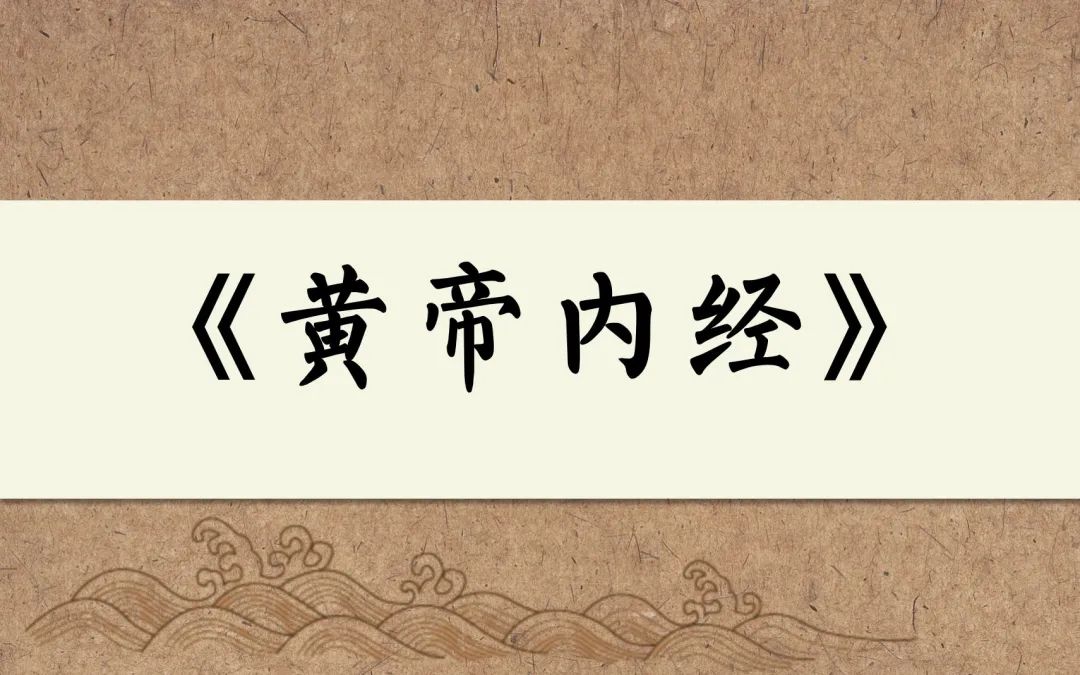
 Original Text and Translation
Original Text and Translation Volume One: Suwen Chapter The Treatise on the Original Nature of Man [Original Text] In ancient times, during the reign of the Yellow Emperor, he was born with divine intelligence, spoke well as a child, quickly understood his surroundings in youth, was earnest and diligent as he grew up, and upon reaching adulthood, ascended to the throne. He asked the celestial master: I have heard that people in ancient times lived over a hundred years, and their movements showed no signs of decline; yet people today, at fifty years old, show signs of weakness. Is this due to the difference in times, or is it because people today do not know how to preserve their health? Qi Bo replied: In ancient times, those who understood the way of health preservation followed the principles of Yin and Yang, harmonized with the methods of the seasons, had moderation in food and drink, maintained regularity in daily activities, did not engage in excessive labor, and thus could maintain both body and spirit, living out their natural lifespan and passing away at over a hundred years. However, people today are not like that; they treat wine as water, indulge excessively, become intoxicated and engage in sexual activities, depleting their essence and dissipating their true Qi, unaware of the need to maintain fullness, unable to control their spirit, seeking only momentary pleasures, going against the joys of life, and living without regularity, hence they decline by fifty years.In the teachings of the ancient sages, they all spoke of avoiding the harmful winds and evils, and to do so at the right time, to be tranquil and void, allowing true Qi to flow, and to guard the spirit within, thus diseases have no source. Therefore, they can be at ease and have few desires, their hearts calm and fearless, their bodies labor without fatigue, and their Qi flows smoothly, each fulfilling their wishes. Thus, they enjoy their food, wear what they like, and delight in their customs, regardless of social status, they are called simple and unadorned.Thus, their desires do not tire their eyes, and lustful evils do not confuse their hearts; whether foolish or wise, virtuous or unworthy, they are not troubled by external matters, thus they align with the Dao. Therefore, they can all live to over a hundred years without showing signs of decline, due to their complete virtue and safety.The Emperor said: Is it that a person who is old and has no children is due to exhaustion of their strength? Is it the will of heaven? Qi Bo said: A girl at seven years old, the kidney Qi is abundant, her teeth change and her hair grows long. At fourteen, the Tian Gui arrives, the Ren Mai is open, the Tai Chong pulse is strong, and menstruation occurs regularly, thus she can have children. At twenty-one, the kidney Qi is balanced, thus true teeth grow and reach their full length. At twenty-eight, the tendons and bones are strong, hair grows abundantly, and the body is robust. At thirty-five, the Yangming pulse weakens, the face begins to wither, and hair begins to fall out. At forty-two, the three Yang pulses weaken above, the face becomes haggard, and hair begins to turn white. At forty-nine, the Ren Mai Qi weakens, the Tai Chong pulse weakens, the Tian Gui is exhausted, and the pathways of the earth are blocked, thus the body deteriorates and cannot have children.A boy at eight years old, the kidney Qi is full, hair grows long and teeth change. At sixteen, the kidney Qi is abundant, the Tian Gui arrives, essence overflows, and with the harmony of Yin and Yang, he can have children. At twenty-four, the kidney Qi is full, the tendons and bones are strong, and true teeth grow fully. At thirty-two, the tendons and bones are robust, and the muscles are full and strong. At forty, the kidney Qi declines, hair begins to fall out, and teeth begin to decay. At forty-eight, the Yang Qi above weakens, the face becomes haggard, and hair turns gray. At fifty-six, the liver Qi weakens, and the tendons and bones cannot move freely. At sixty-four, the Tian Gui is exhausted, essence is scarce, the kidneys decline, and hair and teeth fall out, the body becomes fatigued.The kidneys govern water, receiving the essence of the five Zang and six Fu organs and storing it, thus when the five Zang are strong, they can overflow. Now, with the decline of the five Zang, the tendons and bones weaken, the Tian Gui is exhausted, hence hair turns white, the body becomes heavy, steps become unsteady, and one cannot have children.The Emperor said: What is the reason for those who are old yet still have children? Qi Bo said: This is due to their innate vitality exceeding that of others, their Qi and blood pathways remain open, and their kidney Qi is sufficient. Although they can have children, men generally do not exceed sixty-four years, and women do not exceed forty-nine years, after which the essence is exhausted.The Emperor said: Can those who understand the way of health preservation live to be a hundred and still have children? Qi Bo said: Those who understand the way of health preservation can resist aging and maintain their form; although they are old, they can still have children.The Emperor said: I have heard that in ancient times there were those called true people, who grasped the changes of heaven and earth, controlled Yin and Yang, regulated their breath, and maintained their spirit, their flesh and bones were unified, thus they could live as long as heaven and earth without an end; this is the result of their Dao cultivation.In the middle ages, there were those called supreme individuals, who possessed pure virtue and complete Dao, harmonized with Yin and Yang, adjusted to the four seasons, distanced themselves from worldly affairs, accumulated essence and preserved spirit, roamed between heaven and earth, and their vision and hearing extended beyond the ordinary; this indeed enhanced their lifespan and strength, and they also belong to the category of true people.Next, there are those called sages, who dwell harmoniously within heaven and earth, follow the principles of the eight winds, adapt their desires to the customs of the world, harbor no anger or hatred, act without departing from the world, wear simple clothing, and do not seek to stand out; externally, they do not overexert their bodies in work, and internally, they have no burdensome thoughts, aiming for tranquility and joy, and finding satisfaction in self-contentment; thus their bodies do not easily decay, and their spirits do not easily scatter, allowing them to also reach a hundred years.Next, there are those called wise individuals, who follow the laws of heaven and earth, resemble the sun and moon, discern the positions of the stars, follow the changes of Yin and Yang, and adapt to the transformations of the four seasons, thus they can also enhance their lifespan, but they still have an end.[Annotations] ① Celestial Master: A title of respect the Yellow Emperor gives to Qi Bo. ② Harmonizing with methods: Refers to using appropriate health preservation methods to harmonize the body. ③ Tranquility and void: Tranquility refers to being calm and quiet; void refers to having no distracting thoughts; tranquility and void mean having a calm and quiet mind without any distractions. ④ Tian Gui: Refers to the innate essence stored in the kidneys, which promotes the development and maturation of reproductive functions. ⑤ Grasping heaven and earth: Refers to being able to master the laws of natural changes. ⑥ Anger and hatred: Anger refers to rage; hatred refers to enmity; generally refers to feelings of anger and hatred. 【Translation】
Volume One: Suwen Chapter The Treatise on the Original Nature of Man [Original Text] In ancient times, during the reign of the Yellow Emperor, he was born with divine intelligence, spoke well as a child, quickly understood his surroundings in youth, was earnest and diligent as he grew up, and upon reaching adulthood, ascended to the throne. He asked the celestial master: I have heard that people in ancient times lived over a hundred years, and their movements showed no signs of decline; yet people today, at fifty years old, show signs of weakness. Is this due to the difference in times, or is it because people today do not know how to preserve their health? Qi Bo replied: In ancient times, those who understood the way of health preservation followed the principles of Yin and Yang, harmonized with the methods of the seasons, had moderation in food and drink, maintained regularity in daily activities, did not engage in excessive labor, and thus could maintain both body and spirit, living out their natural lifespan and passing away at over a hundred years. However, people today are not like that; they treat wine as water, indulge excessively, become intoxicated and engage in sexual activities, depleting their essence and dissipating their true Qi, unaware of the need to maintain fullness, unable to control their spirit, seeking only momentary pleasures, going against the joys of life, and living without regularity, hence they decline by fifty years.In the teachings of the ancient sages, they all spoke of avoiding the harmful winds and evils, and to do so at the right time, to be tranquil and void, allowing true Qi to flow, and to guard the spirit within, thus diseases have no source. Therefore, they can be at ease and have few desires, their hearts calm and fearless, their bodies labor without fatigue, and their Qi flows smoothly, each fulfilling their wishes. Thus, they enjoy their food, wear what they like, and delight in their customs, regardless of social status, they are called simple and unadorned.Thus, their desires do not tire their eyes, and lustful evils do not confuse their hearts; whether foolish or wise, virtuous or unworthy, they are not troubled by external matters, thus they align with the Dao. Therefore, they can all live to over a hundred years without showing signs of decline, due to their complete virtue and safety.The Emperor said: Is it that a person who is old and has no children is due to exhaustion of their strength? Is it the will of heaven? Qi Bo said: A girl at seven years old, the kidney Qi is abundant, her teeth change and her hair grows long. At fourteen, the Tian Gui arrives, the Ren Mai is open, the Tai Chong pulse is strong, and menstruation occurs regularly, thus she can have children. At twenty-one, the kidney Qi is balanced, thus true teeth grow and reach their full length. At twenty-eight, the tendons and bones are strong, hair grows abundantly, and the body is robust. At thirty-five, the Yangming pulse weakens, the face begins to wither, and hair begins to fall out. At forty-two, the three Yang pulses weaken above, the face becomes haggard, and hair begins to turn white. At forty-nine, the Ren Mai Qi weakens, the Tai Chong pulse weakens, the Tian Gui is exhausted, and the pathways of the earth are blocked, thus the body deteriorates and cannot have children.A boy at eight years old, the kidney Qi is full, hair grows long and teeth change. At sixteen, the kidney Qi is abundant, the Tian Gui arrives, essence overflows, and with the harmony of Yin and Yang, he can have children. At twenty-four, the kidney Qi is full, the tendons and bones are strong, and true teeth grow fully. At thirty-two, the tendons and bones are robust, and the muscles are full and strong. At forty, the kidney Qi declines, hair begins to fall out, and teeth begin to decay. At forty-eight, the Yang Qi above weakens, the face becomes haggard, and hair turns gray. At fifty-six, the liver Qi weakens, and the tendons and bones cannot move freely. At sixty-four, the Tian Gui is exhausted, essence is scarce, the kidneys decline, and hair and teeth fall out, the body becomes fatigued.The kidneys govern water, receiving the essence of the five Zang and six Fu organs and storing it, thus when the five Zang are strong, they can overflow. Now, with the decline of the five Zang, the tendons and bones weaken, the Tian Gui is exhausted, hence hair turns white, the body becomes heavy, steps become unsteady, and one cannot have children.The Emperor said: What is the reason for those who are old yet still have children? Qi Bo said: This is due to their innate vitality exceeding that of others, their Qi and blood pathways remain open, and their kidney Qi is sufficient. Although they can have children, men generally do not exceed sixty-four years, and women do not exceed forty-nine years, after which the essence is exhausted.The Emperor said: Can those who understand the way of health preservation live to be a hundred and still have children? Qi Bo said: Those who understand the way of health preservation can resist aging and maintain their form; although they are old, they can still have children.The Emperor said: I have heard that in ancient times there were those called true people, who grasped the changes of heaven and earth, controlled Yin and Yang, regulated their breath, and maintained their spirit, their flesh and bones were unified, thus they could live as long as heaven and earth without an end; this is the result of their Dao cultivation.In the middle ages, there were those called supreme individuals, who possessed pure virtue and complete Dao, harmonized with Yin and Yang, adjusted to the four seasons, distanced themselves from worldly affairs, accumulated essence and preserved spirit, roamed between heaven and earth, and their vision and hearing extended beyond the ordinary; this indeed enhanced their lifespan and strength, and they also belong to the category of true people.Next, there are those called sages, who dwell harmoniously within heaven and earth, follow the principles of the eight winds, adapt their desires to the customs of the world, harbor no anger or hatred, act without departing from the world, wear simple clothing, and do not seek to stand out; externally, they do not overexert their bodies in work, and internally, they have no burdensome thoughts, aiming for tranquility and joy, and finding satisfaction in self-contentment; thus their bodies do not easily decay, and their spirits do not easily scatter, allowing them to also reach a hundred years.Next, there are those called wise individuals, who follow the laws of heaven and earth, resemble the sun and moon, discern the positions of the stars, follow the changes of Yin and Yang, and adapt to the transformations of the four seasons, thus they can also enhance their lifespan, but they still have an end.[Annotations] ① Celestial Master: A title of respect the Yellow Emperor gives to Qi Bo. ② Harmonizing with methods: Refers to using appropriate health preservation methods to harmonize the body. ③ Tranquility and void: Tranquility refers to being calm and quiet; void refers to having no distracting thoughts; tranquility and void mean having a calm and quiet mind without any distractions. ④ Tian Gui: Refers to the innate essence stored in the kidneys, which promotes the development and maturation of reproductive functions. ⑤ Grasping heaven and earth: Refers to being able to master the laws of natural changes. ⑥ Anger and hatred: Anger refers to rage; hatred refers to enmity; generally refers to feelings of anger and hatred. 【Translation】
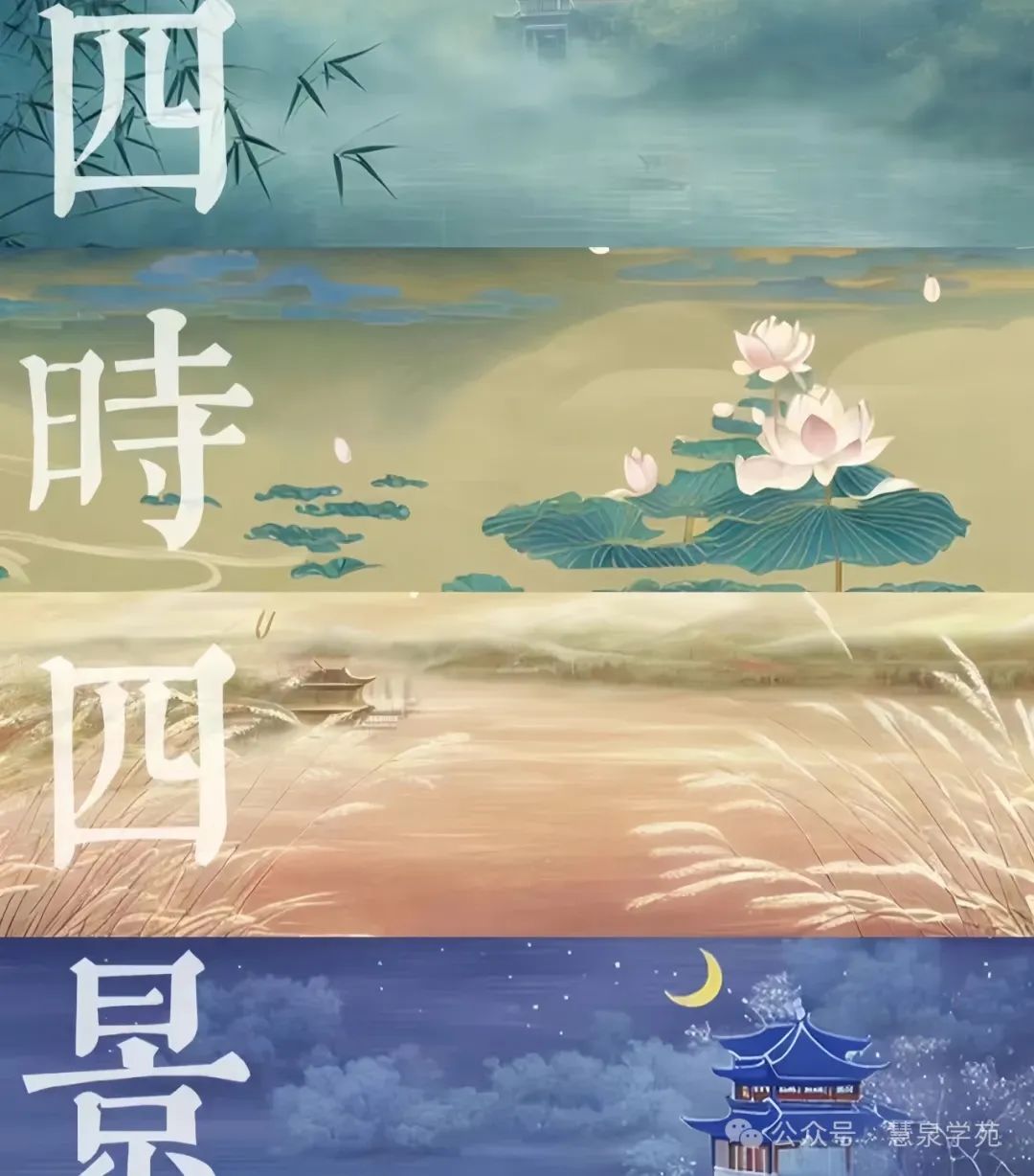
In the three months of spring, it is called “Fa Chen” (the emergence of life). Heaven and earth are born together, and all things flourish. One should sleep at night and rise early, walk broadly in the courtyard, let down their hair, and loosen their clothing to allow the body to relax, and take leisurely steps to enjoy the spirit of life. Do not engage in killing, give generously, take less, reward more, and punish less; this is the response to the spring Qi and the way of health preservation. To go against it would harm the liver, leading to cold changes in summer, and those who are nurturing will have less.In the three months of summer, it is called “Fan Xiu” (prosperity and beauty). The Qi of heaven and earth interacts, and all things bloom and bear fruit. One should sleep at night and rise early, not tire of the long days, keep the spirit from anger, allow the flowers to flourish, and let the Qi flow freely, as if what one loves is outside; this is the response to the summer Qi and the way of nurturing. To go against it would harm the heart, leading to autumn fevers, and those who are harvesting will have less, and in winter, serious illnesses.In the three months of autumn, it is called “Rong Ping” (calm and balance). The weather becomes urgent, and the earth’s Qi becomes clear. One should sleep early and rise early, rising with the rooster, to keep the spirit calm, to ease the autumn’s harshness, to gather the spirit, to keep the autumn Qi balanced, not to let the spirit wander, and to keep the lung Qi clear; this is the response to the autumn Qi and the way of nurturing. To go against it would harm the lungs, leading to winter diarrhea, and those who are storing will have less.In the three months of winter, it is called “Bi Cang” (closure and storage). Water freezes and the earth cracks; do not disturb the Yang, sleep early and rise late, wait for the sunlight to rise, keep the spirit hidden and concealed, as if having private intentions, as if already having gained, avoid the cold and seek warmth, do not let the skin leak, causing the Qi to be lost. This is the response to the winter Qi and the way of nurturing storage. To go against it would harm the kidneys, leading to spring atrophy, and those who are nurturing will have less.The weather is clear and bright, and the hidden virtue does not cease, thus it does not descend. When the heavens are bright, the sun and moon are not bright, evil harms the empty cavities. Yang Qi is closed, and earth Qi is exposed; if clouds and mist are not pure, then the white dew will not fall. If the interactions do not manifest, all things will die, and if they do not manifest, many trees will die. If evil Qi does not rise, and wind and rain are not timely, the white dew will not fall, then the grasses will not flourish. If the evil winds come frequently, and violent rains occur often, the four seasons of heaven and earth will not be preserved, and the Dao will be lost, then life will be cut short. Only the sage follows this, thus the body has no strange diseases, and all things do not perish, and the vital energy does not diminish. To go against the spring Qi would lead to a lack of Yang, and the liver Qi would change internally. To go against the summer Qi would lead to a lack of sun, and the heart Qi would become internally hollow. To go against the autumn Qi would lead to a lack of Yin, and the lung Qi would become full and distended. To go against the winter Qi would lead to a lack of Yin, and the kidney Qi would sink. The changes of the four seasons of Yin and Yang are the root of all things. Therefore, sages nurture Yang in spring and summer, and Yin in autumn and winter, to follow their roots; thus they float with all things in the process of life. To go against their roots would cut off their foundation and destroy their true essence. Therefore, the Yin and Yang of the four seasons are the end of all things; they are the root of life and death; to go against them would bring disaster, to follow them would prevent severe diseases; this is called understanding the Dao. The Dao is practiced by sages, while foolish people wear it as an ornament. Following Yin and Yang leads to life, going against it leads to death; following it leads to order, going against it leads to chaos. Reversal and following are opposites, this is called internal conflict. Therefore, sages do not treat already existing diseases, but treat those that have not yet manifested; they do not treat already existing chaos, but treat chaos that has not yet arisen; this is what it means. When a disease has already formed, then medicine is used; when chaos has already formed, then it is treated; this is like digging a well when thirsty, or forging a weapon after war has begun; is it not too late?

